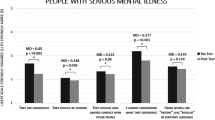Abstract
Background Work Done in India: The Indian partner of the SICRG-funded project has done work in the area of de-stigmatization of mental illness. The Prakashdoot project, which aims at spreading public awareness about depression and alcohol use in a difficult to access population through use of a DVD followed by FAQs, is described. Prakashdoot DVDs show impact on public understanding of mental distress and pave the way to a less stigmatizing society. Dwij Puraskar, another effort along similar lines, with a difference, is also described. Stigma is a complex construct with cognitive (stereotypic beliefs), affective (fear, shame, embarrassment), and behavioral (avoidance—social distance) components (Sovani 2009). Finally, the paper ends with narratives emerging from roundtables held with students from India studying psychology and education. Jorm (2000) introduced the concept of mental health literacy, defining it as public knowledge and beliefs about mental disorders. Its components are the ability to recognize disorders, beliefs about causes, knowledge about self-help and professional interventions, and attitudes that facilitate help seeking. Background Work Done in Canada: The Canadian partner of the same SICRG-funded project has done prior work in the area of inclusion and exclusion under the Belonging project. Photographs are used as a way to develop a visual portrayal of where students feel included and excluded, using a photovoice methodology (Cabassa et al. 2013, Catalani and Minkler 2010). In a workshop conducted in Vancouver in July 2016, both Dr. Sovani and Dr. Stack spoke of their experiences while working with marginalized communities in India and Canada, respectively. Dr. Sovani used a unique presentation style that comprised entirely of picture slides and no text. She used this to illustrate how the experience of a group such as persons with chronic mental illness can be de-stigmatized using unique public awareness strategies and went on to describe to the largely Canadian audience what efforts were being made at the Institute for Psychological Health. Interestingly, the participants in the workshop had no difficulty at all understanding the predicament of a person with chronic mental illness and the efforts that need to be taken by the patient, the caregiver as well as society to ensure their smooth inclusion back into the social fabric. The universality of the experience of stigma thus came through very clearly. As a counterpoint, Dr. Michelle Stack and her students discussed how native Indian populations get marginalized on their own land and the manner in which people identify them by their rather unique facial features which stand apart from the Caucasian look of others who settled in Canada much later. Many participants then shared personal stories of both kinds, viz. struggling with societal nonacceptance, and consequently, personal nonacceptance, of their mentally ill or American Indian native status. Current Work: Challenging stigmatizing narratives about mental illness is key to the wellness of communities (Wahl 2003). Through our work, we test methods to assist professionals and students to de-stigmatize their language with an aim of expanding public understandings of mental health. Work on the SICRG project involves initial roundtables with students of psychology, education, and media, which have commenced at both study sites, i.e., India and Canada, using news media portrayals. This paper will highlight some of the trends that are emerging from all three groups. Implications are also discussed vis-a-vis student mental health (Stack 2007) and public awareness and sensitivity. As part of the SICI project, the two researchers actively engaged with students from the “other culture,” i.e., Dr. Sovani with the Canadian students and Dr. Stack with the Indian students. The processes involved are described.
This paper may be subsumed under the area of social sciences and education, specifically public health education.
Access this chapter
Tax calculation will be finalised at checkout
Purchases are for personal use only
Similar content being viewed by others
References
Cabassa, L. J., Nicasio, A., & Whitley, R. (2013). Picturing recovery: A photovoice exploration of recovery dimensions among people with serious mental illness. Psychiatric Services, 64(9), 837–842.
Catalani, C., & Minkler, M. (2010). Photovoice: A review of the literature in health and public health. Health Education & Behavior, 37(3), 424–451.
Corrigan, P. W. (2012). Where is the evidence supporting public service announcements to eliminate mental illness stigma? Psychiatric Services, 63, 79–83.
Corrigan, P. W., & Lundin, R. (2012). Coming out proud program manual. IL, Chicago: National Consortium on Stigma and Empowerment.
Corrigan, P. W., Larson, J. E., & Rusch, N. (2009). Self stigma and the “why try” effect: impact on life goals and evidence based practices. World Psychiatry, 8(2), 75–81.
Corrigan, P. W., Morris, S. B., Michaels, P. J., Rafacz, J. D., & Rüsch, N. (2012). Challenging the public stigma of mental illness: A meta-analysis of outcome studies. Psychiatric Services, 63, 963–973.
Jorm, A. F. (2000). Mental health literacy—Public knowledge and beliefs about mental disorders. The British Journal of Psychiatry, 177(5), 396–401.
Linley, P. A., & Joseph, S. (2004). Positive change following trauma and adversity: A review. Journal of Traumatic Stress, 17(1), 11–21.
Nadkarni, A., Velleman, R., Dabholkar, H., Shinde, S., Bhat, B., McCambridge, J., Murthy, P., Wilson, T., Weobong, B., & Patel, V. (2015). The systematic development and randomized evaluation of the counselling for alcohol problems, a lay counsellor delivered psychological treatment for harmful drinking in primary care in India: the PREMIUM study. Alcoholism: Clinical & Experimental Research, 39(3), 522–531.
Sovani, Anuradha. (2009). Shubharthis in India: De-stigmatising schizophrenia—A move towards inclusion. In C. A. Marshall, E. Kendall, R. M. S. Gover, & M. Banks (Eds.), Disabilities: Insights from across fields and around the world (pp. 231–242). Westport, CT: Praeger Press.
Stack, M. (2007). Constructing “common sense” policies for schools: The role of journalists. International Journal of Leadership in Education: Theory and Practice, 10(3), 247–264.
Wahl, O. (2003). News media portrayal of mental illness implications for public policy. American Behavioral Scientist, 46(12), 1594.
Acknowledgements
This paper acknowledges the research partner, Dr. Michelle Stack, Department of Educational Studies, University of British Columbia, Vancouver. We also acknowledge the support of the SICRG grant of the Shastri Indo Canadian Institute for the project titled Knowledge Mobilization: Expanding Cross-Cultural Conversations about Mental health and illness.
Author information
Authors and Affiliations
Corresponding author
Editor information
Editors and Affiliations
Rights and permissions
Copyright information
© 2019 Springer Nature Singapore Pte Ltd.
About this chapter
Cite this chapter
Sovani, A. (2019). Triggering Conversations About Mental Health. In: Gayithri, K., Hariharan, B., Chattopadhyay, S. (eds) Nation-Building, Education and Culture in India and Canada. Springer, Singapore. https://doi.org/10.1007/978-981-13-6741-0_11
Download citation
DOI: https://doi.org/10.1007/978-981-13-6741-0_11
Published:
Publisher Name: Springer, Singapore
Print ISBN: 978-981-13-6740-3
Online ISBN: 978-981-13-6741-0
eBook Packages: EducationEducation (R0)




